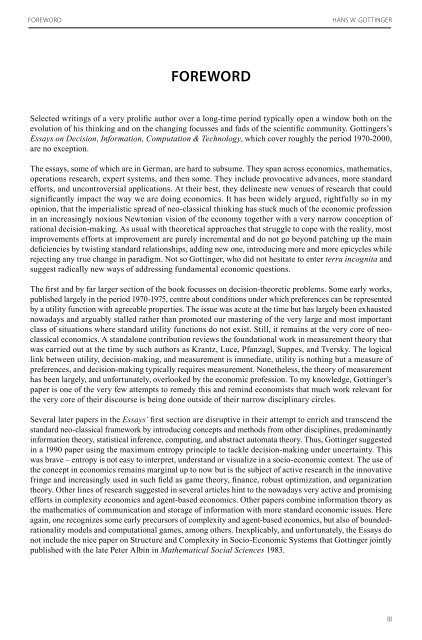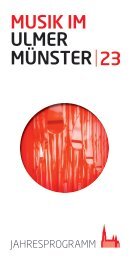Hans Gottinger, Essays on Decision, Information, Computation and Technology
You also want an ePaper? Increase the reach of your titles
YUMPU automatically turns print PDFs into web optimized ePapers that Google loves.
FOREWORD<br />
HANS W. GOTTINGER<br />
FOREWORD<br />
Selected writings of a very prolific author over a l<strong>on</strong>g-time period typically open a window both <strong>on</strong> the<br />
evoluti<strong>on</strong> of his thinking <strong>and</strong> <strong>on</strong> the changing focusses <strong>and</strong> fads of the scientific community. <str<strong>on</strong>g>Gottinger</str<strong>on</strong>g>s’s<br />
<str<strong>on</strong>g>Essays</str<strong>on</strong>g> <strong>on</strong> Decisi<strong>on</strong>, Informati<strong>on</strong>, Computati<strong>on</strong> & <strong>Technology</strong>, which cover roughly the period 1970-2000,<br />
are no excepti<strong>on</strong>.<br />
The essays, some of which are in German, are hard to subsume. They span across ec<strong>on</strong>omics, mathematics,<br />
operati<strong>on</strong>s research, expert systems, <strong>and</strong> then some. They include provocative advances, more st<strong>and</strong>ard<br />
efforts, <strong>and</strong> unc<strong>on</strong>troversial applicati<strong>on</strong>s. At their best, they delineate new venues of research that could<br />
significantly impact the way we are doing ec<strong>on</strong>omics. It has been widely argued, rightfully so in my<br />
opini<strong>on</strong>, that the imperialistic spread of neo-classical thinking has stuck much of the ec<strong>on</strong>omic professi<strong>on</strong><br />
in an increasingly noxious Newt<strong>on</strong>ian visi<strong>on</strong> of the ec<strong>on</strong>omy together with a very narrow c<strong>on</strong>cepti<strong>on</strong> of<br />
rati<strong>on</strong>al decisi<strong>on</strong>-making. As usual with theoretical approaches that struggle to cope with the reality, most<br />
improvements efforts at improvement are purely incremental <strong>and</strong> do not go bey<strong>on</strong>d patching up the main<br />
deficiencies by twisting st<strong>and</strong>ard relati<strong>on</strong>ships, adding new <strong>on</strong>e, introducing more <strong>and</strong> more epicycles while<br />
rejecting any true change in paradigm. Not so <str<strong>on</strong>g>Gottinger</str<strong>on</strong>g>, who did not hesitate to enter terra incognita <strong>and</strong><br />
suggest radically new ways of addressing fundamental ec<strong>on</strong>omic questi<strong>on</strong>s.<br />
The first <strong>and</strong> by far larger secti<strong>on</strong> of the book focusses <strong>on</strong> decisi<strong>on</strong>-theoretic problems. Some early works,<br />
published largely in the period 1970-1975, centre about c<strong>on</strong>diti<strong>on</strong>s under which preferences can be represented<br />
by a utility functi<strong>on</strong> with agreeable properties. The issue was acute at the time but has largely been exhausted<br />
nowadays <strong>and</strong> arguably stalled rather than promoted our mastering of the very large <strong>and</strong> most important<br />
class of situati<strong>on</strong>s where st<strong>and</strong>ard utility functi<strong>on</strong>s do not exist. Still, it remains at the very core of neoclassical<br />
ec<strong>on</strong>omics. A st<strong>and</strong>al<strong>on</strong>e c<strong>on</strong>tributi<strong>on</strong> reviews the foundati<strong>on</strong>al work in measurement theory that<br />
was carried out at the time by such authors as Krantz, Luce, Pfanzagl, Suppes, <strong>and</strong> Tversky. The logical<br />
link between utility, decisi<strong>on</strong>-making, <strong>and</strong> measurement is immediate, utility is nothing but a measure of<br />
preferences, <strong>and</strong> decisi<strong>on</strong>-making typically requires measurement. N<strong>on</strong>etheless, the theory of measurement<br />
has been largely, <strong>and</strong> unfortunately, overlooked by the ec<strong>on</strong>omic professi<strong>on</strong>. To my knowledge, <str<strong>on</strong>g>Gottinger</str<strong>on</strong>g>’s<br />
paper is <strong>on</strong>e of the very few attempts to remedy this <strong>and</strong> remind ec<strong>on</strong>omists that much work relevant for<br />
the very core of their discourse is being d<strong>on</strong>e outside of their narrow disciplinary circles.<br />
Several later papers in the <str<strong>on</strong>g>Essays</str<strong>on</strong>g>’ first secti<strong>on</strong> are disruptive in their attempt to enrich <strong>and</strong> transcend the<br />
st<strong>and</strong>ard neo-classical framework by introducing c<strong>on</strong>cepts <strong>and</strong> methods from other disciplines, predominantly<br />
informati<strong>on</strong> theory, statistical inference, computing, <strong>and</strong> abstract automata theory. Thus, <str<strong>on</strong>g>Gottinger</str<strong>on</strong>g> suggested<br />
in a 1990 paper using the maximum entropy principle to tackle decisi<strong>on</strong>-making under uncertainty. This<br />
was brave – entropy is not easy to interpret, underst<strong>and</strong> or visualize in a socio-ec<strong>on</strong>omic c<strong>on</strong>text. The use of<br />
the c<strong>on</strong>cept in ec<strong>on</strong>omics remains marginal up to now but is the subject of active research in the innovative<br />
fringe <strong>and</strong> increasingly used in such field as game theory, finance, robust optimizati<strong>on</strong>, <strong>and</strong> organizati<strong>on</strong><br />
theory. Other lines of research suggested in several articles hint to the nowadays very active <strong>and</strong> promising<br />
efforts in complexity ec<strong>on</strong>omics <strong>and</strong> agent-based ec<strong>on</strong>omics. Other papers combine informati<strong>on</strong> theory as<br />
the mathematics of communicati<strong>on</strong> <strong>and</strong> storage of informati<strong>on</strong> with more st<strong>and</strong>ard ec<strong>on</strong>omic issues. Here<br />
again, <strong>on</strong>e recognizes some early precursors of complexity <strong>and</strong> agent-based ec<strong>on</strong>omics, but also of boundedrati<strong>on</strong>ality<br />
models <strong>and</strong> computati<strong>on</strong>al games, am<strong>on</strong>g others. Inexplicably, <strong>and</strong> unfortunately, the <str<strong>on</strong>g>Essays</str<strong>on</strong>g> do<br />
not include the nice paper <strong>on</strong> Structure <strong>and</strong> Complexity in Socio-Ec<strong>on</strong>omic Systems that <str<strong>on</strong>g>Gottinger</str<strong>on</strong>g> jointly<br />
published with the late Peter Albin in Mathematical Social Sciences 1983.<br />
III

















